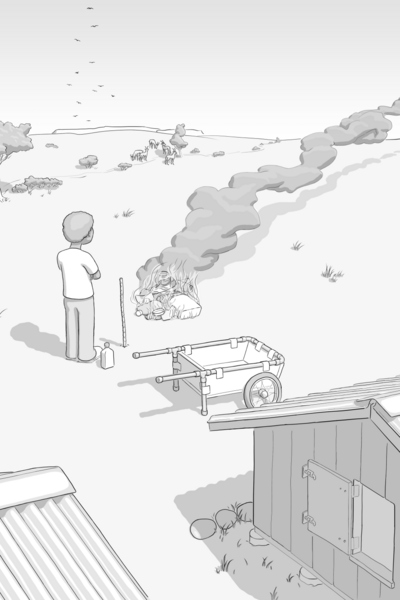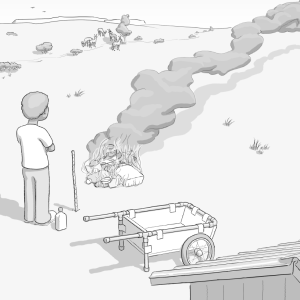***2013***(0090)
“It’s cold down here.”
“Hand me the flashlight”
“Can you tell me why we are doing this"
“I want to make sure nothing was damaged when they loaded the crates.”
“Hey Sergei? Do you still feel sick?”
“A little. You know this is my first time on a ship.”
“Mine too. And the flight to Lagos was my first time in a plane.”
“I am almost seventy, you still have a big lead on me.”
“I don’t think I have ever been on a boat of any size. I can’t swim either.”
“Really?”
“In Africa, if you go in the water you either get eaten by something or you contract parasites.”
“Oh… and I guess there were no swimming pools in your village…”
“No. Not much water of any sort.”
“These are them! Hand me the crowbar.” The two men pried the tops off of two massive crates.
“Not attractive machines...”
“They are covered in anti-corrosive jelly.”
“Still, the machines we already have look better.”
“These are larger and heavier. Better for working with the alloys that we will need for the engines, and also big enough to make the airframe components. These are as good as the machines we used in Moscow. Maybe better.”
“What does Kleinenbrucher mean?”
“I don’t know, but it is a good brand. And the seller was almost giving them away.”
“Do you know what they were used for?”
“They were used to make parts for oil drilling. But they have been sitting in a warehouse for the past three years. The Servos and controllers are top-notch, and they were added fairly recently. Once we clean these up, we will have the best shop in East Africa.”
“Really?”
“It is a possibility. Well Masinga, you must be glad now that you did not go to MIT.”
“I haven’t felt that way for more than a year.”
“If you had gone, you could be making twenty times as much money, and working on the most advanced rockets.”
“Yes, but then I would never have a chance to work in the kitchen of a tramp-steamer.”
“Hah! That will look good on our resume if this company fails.”
“Can we go now? I’m cold.”
“Alright, I’m satisfied. Just help me get the tops back on. The captain said that if we go on deck in a couple of hours, we will be able to see the Cape.”
***2015***(0100)
<<Greetings Ivan,>>
A team of us traveled to the coastal site on my second day in Kenya. The mission was to inspect and document the state of the launch platform and other facilities. The team was comprised of myself, Yuri, Sergei, Boris, Masinga, and Embu, who remains the head of the newly reconstituted Kenyan Space Administration (KSA), which is now his sole responsibility. Also present were professor Kamburu’s son, and a Kenyan national who works on oil platforms around the coast of Africa.
Some of the signage on the platform was written only in Italian, which none of us could read. Even with the help of a satellite internet connection, we had difficulty translating some of the words. One such sign, which looked important, was on the side of a large floating section that is adjacent to the main platform (which is on enormous fixed pilings). The floating section, was used for onloading and offloading of personnel, equipment and propellant. Eventually the oil-man solved the puzzle, and determined that the sign indicated a location to which sacrificial anodes should be bolted in order to prevent corrosion. Unfortunately there was no anode present, and probably hadn’t been for decades. It now seems likely that for the lack of a few hundred dollars worth of Zinc ingots, a million dollars of repair work will be needed.
Fortunately, the main platform is in excellent condition, though it appears to have been looted several times since it was abandoned back in the seventies. Among the few movable pieces of equipment that had not been taken by scavengers was a large, stainless steel capuccino maker that we found in the command center.
The platform should be easily adaptable to the launch of Mark 11 (also called Reach-1). The word “reach” has strong connotations of aspiration in Swahili, and it is also part of the KSA motto, “Reach Higher”.
The shoreline adjacent to the platform is at the estuary of a dying river, and consists of pestilential brackish marshland (we were cautioned to take anti-malarials before the expedition). All usable land is farmed by squatters, who get only a poor yield for their efforts. They also fish from small boats, with similarly poor results.
Professor Kamburu and his associates at the university have devised an ambitious plan to relocate the dwellings of these squatters, inland, and to give them official rights to farm the land around the launch site for a minimal rent. The land is to be adapted to the raising of prawns, a valuable commodity, and a much needed source of dietary protein. Kamburu really is a frustrated Utopian, and he reminds me of some of the academics and officials that I knew in the fifties and sixties, under communist rule.
I already love it here, and I look forward to sending you more such updates soon!
<<Godspeed friends, and Reach Higher>>,
Grigori
“We’re missing all of the action.” Said Maxim. “I think I can be free to move later this year. How about you?”
“The Vostok revision is going well, and it should position us to remain competitive in the launch market for at least a few years… but I’m sure the bureau will want me to stay until at least next fall. I guess I’ll be the last to go.”
“Ironic… So, do you want to play.”
“Poker with just two people. What’s the point?”











Comments (0)
See all